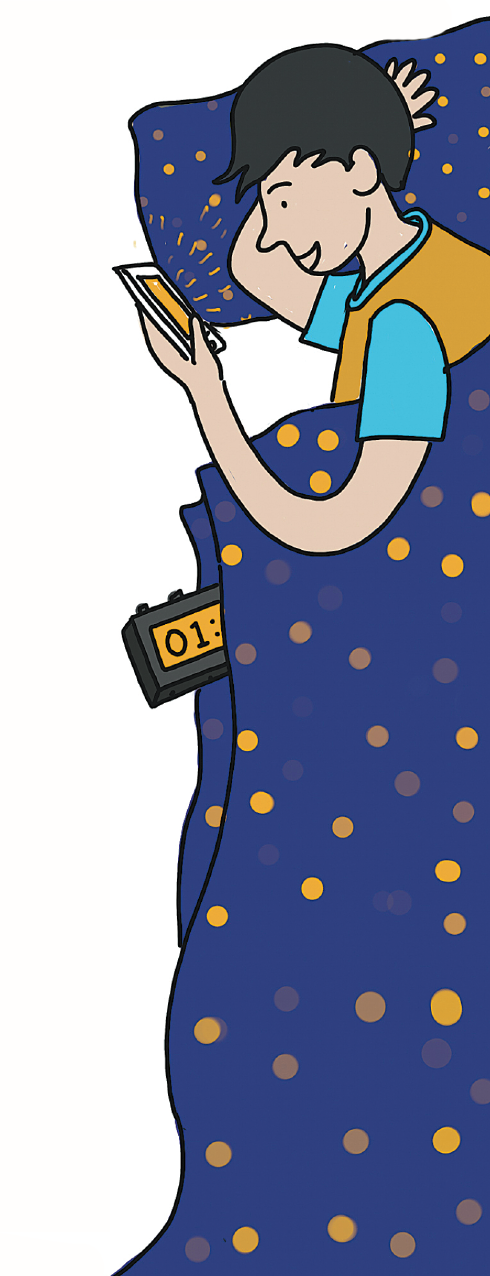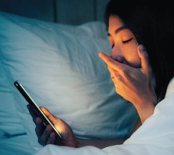THE TROUBLE WITH SLEEP
We all need it, but for many it's a nuisance that they feel deprives them of living, Zhang Lei reports.

For night owls like Chen Danhong, 28, who works for a technology company in Beijing, the day really just begins after about 8 pm, a psychological hint that she can relax, she says.
"When I get home I'm feeling worn out and tired, but that suddenly turns to excitement and I go on the internet, read novels or watch movies. I'll be playing video games and continually saying to myself, "OK, this is the last one" before I eventually realize that it's 2 o'clock. It's the same with watching TV, bingeing on a whole series before I realize it's 4 o'clock."
For Chen, breaking promises about getting enough sleep has become a way of life. "I know that if things go on like this it's going to take a toll on my health, but I just can't help myself."
Chen is suffering from what is called unforced sleeplessness, a term borrowed from tennis, in which an unforced error refers to a mistake that occurs when there is no pressure.
Common symptoms include falling asleep later than 2 am, with the average time taken to fall asleep being more than one hour. Young people in cities are most vulnerable to such symptoms, according to the 2020 Chinese National Healthy Sleep White Paper by the China Sleep Research Association. Common causes are loneliness, overtime sequelae, excessive stress and emotional disorders.
Nearly 75 percent of respondents to a survey said they had sleep problems, the paper says. The incidence of insomnia among Chinese adults is as high as 38.2 percent, which means that more than 300 million Chinese have sleep disorders. The most common of these are insomnia and obstructive sleep apnea syndrome.
The Sleeping Obsessive-Compulsive Disorder Group on the social media site Douban, founded in 2006, says it has more than 100,000 members. Words you will often hear members of the group using include procrastination, anxiety and escapism.
"I really can't do anything about going to bed early," one member said in a posting.
On March 21, designated by the United Nations as World Sleep Day, Nanguo Morning News, a newspaper in Guangxi autonomous region, conducted a survey that attracted 2,000 respondents, Forty-three percent of them said they sleep late every day because they feel that the only time of the day that truly belongs to them is just before they go to bed, and they treasure that so much that they are reluctant to sleep.
About 36 percent of respondents said they go to bed late at least three days a week, and only 2 percent said they never go to bed late. According to the survey, the reasons for going to bed late vary widely, with overtime work or taking care of a baby accounting for just 5 percent of the respondents' answers on this question. Sixty-four percent said they sleep late because they watch dramas, variety shows, read books or play with their mobile phones. Fourteen percent said they do not want to go to bed too early even if they have nothing to do.
Twenty-six percent said their time during the day has been occupied by work and children, and they want to enjoy the time that truly belongs to them; 25 percent said they are very sleepy and tired in the middle of the night, but their minds are very active; 21 percent said a hindrance to sleep is their mobile phone, while at the same time doing things with them makes them happy as they retired for the night.
"I don't like staying up late, but I'm reluctant to sleep," says Wang Yan, an office worker who has a 7-year-old son. "I'm not willing to let the day just slip away."
After she is woken up by the alarm clock in the morning she makes breakfast for the whole family and sends her son to school. She then rushes to work, picks up her son about 5 pm, goes to the vegetable market, and then returns home to cook dinner. Her activities after that include helping her son with his homework.
"When I finally coax my little devil into bed, I take a quick shower and go to bed myself, by which time it's 11 o'clock. To that point of the day not a single minute of the day really belongs to me."
She explains different stages of her sleeping disorder. In the early stage she falls asleep about 1 am, but browses through her mobile phone applications before lying down. She finally falls asleep about 3 am, but after that she is still semi-active mentally and tosses and turns in bed.
"The mentality of going to bed late is obviously redemptive, and people believe that at night they are somehow making up for the day," says Yan Lixin, chief physician in the Department of Mental Health of the Second Hospital of Lanzhou University.
"By day these people often have low self-esteem, feeling they did not do what they would really like to do. When night time comes they feel the urge to do something to compensate for that 'lost time'. They'll think, 'I've squeezed my sleep time to get work done, and I really did my best. So you can hardly blame me for the way I'm acting.'"
Encouraged by her family, Zhang eventually consulted a doctor and realized that her problem was a series of psychological problems caused by typical anxiety-induced lack of sleep. Through psychological intervention and drug-assisted treatment her symptoms have been relieved, she says.
Lin Meijuan, a college student, acknowledges that she is so reluctant to sleep that when she feels sleepy, her phone drops on her face, she picks it up and continues to thumb through endless short video clips on TikTok until she eventually falls asleep.
Lin and those like her are tired and stressed during the day, and they need a certain kind of excitement at night to relieve themselves of their mental exhaustion before they can sleep. Such people will spend hours on the internet doing things such as watching videos or chatting, and will burn the midnight oil in nightclubs with fast-paced, strong music to help lift the pressures of the day from their shoulders. Members of the Douban group have a saying:"Sleeping late is a silent protest against what daytime has to offer."
Dai Jian, director of the Clinical Psychology Department of Guangxi Jiangbin Hospital, says there are two key elements in this type of behavior: compulsion and anti-compulsion. That is, knowing that there is no need to do something, but being unable to do it anyway. The three biggest groups of people with this affliction are students, professionals and parents with children, he says.
"Everyone is obsessed with going to bed late, one reason being the explosion of information on the internet."
He sees this as "an unwillingness to put a cap on what was a mediocre day, let alone face the new day that is on its way".
In the questionnaire cited earlier there were respondents who said they had had experience of the dangers of going to be late. Twenty-three percent said they have no serious physiological problems, but they can feel weak, are easily fatigued and have a poor complexion. Twenty-one percent said they were forgetful and found it hard to concentrate.
More worrying is that a reluctance to sleep can lead to a vicious circle, and 15 percent of the respondents said they could not fall asleep even if they wanted to.
Forty-five percent said they resort to self-regulation to tackle the problem, but do not know if it is effective, and 41 percent said they would join a WeChat group to get help with their sleeping problems or try sleeping aids such as sleeping pills or spray. Only 2 percent said they would seek medical help.


Today's Top News
- China's industrial profits down 1.8% in H1
- Thailand responds to Trump's ceasefire call
- Recall vote shows DPP's manipulation runs against Taiwan people's will: mainland spokesperson
- Top DPRK leader visits China-DPRK Friendship Tower
- China proposes global cooperation body on AI
- Scholars propose inclusive human rights framework






























